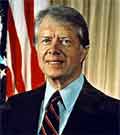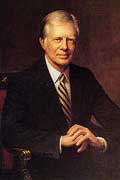
|
Carter, James Earl, Jimmy (b.1924), 39th President of USA (1977-81). Carter's presidency has dropped out for years of transition from reduction (detente) in the Soviet-American relations to their new aggravation during from the end of 1970 to the beginning of 1980. He began the stay in the White house with declaring foreign concepts in spirit of recommendations of "the Tripartite commission" (many members of his study were its members, besides Carter): preservation military reduction from the USSR at accentuation of ideological divergences (human rights) and the general reduction (detente) of priority relations from the USSR due to strengthening relations of USA with the allies and with less developed countries. He passed gradually to more rigid line in relations from the USSR under pressure of the right forces in USA and proceeding geopolitical approach of the USSR. In July 1977 justified a rigid foreign policy of USA concerning the USSR necessity of revival at Americans of feeling of confidence of and in power of the country, in necessity of protection of safety of USA. Simultaneously he assured compatriots that he is not going to expand race of arms or to come back by years of ōcold warö, emphasizing, that "the atmosphere of peaceful co-existence in a much more degree promotes increase of respect for rights of the person, than an atmosphere of enmity or hatred or armed confrontation". The theme of human rights became under Carter's initiative prevailing in the Soviet-American relations on an extent almost Carter's all stay in the White house, causing at the Soviet management misunderstanding any initiatives proceeding from administration of Carter and frequently links in the USSR with a question on human rights. He has signed together with L.I. Brezhnev the Contract about restriction of strategic armaments in Vienna, June 1979, during the Soviet-American Meeting at the summit, it not, however, was ratified substantially owing to the beginning of military intervention of the USSR in Afghanistan that became for Carter a turning point in his perception of the Soviet policy. Has declared a direct of trade and economic sanctions against the USSR, in particular embargo on sale wheat, and also boycott of Olympic games 1980 in Moscow then there has come with the serious deterioration of the Soviet-American relations kept before the ending of 4-years term of stay of Carter in the rank of the President of USA. The next years he was involved with the successors in the White house in conducting informal negotiations with leaders of other countries and under the own initiative participated in informal negotiations on settlement of the international conflicts in various regions of the world. He was engaged actively in charities in USA and abroad and activity on rendering assistance to less developed countries in the decision of social problems. In 1982 he became the professor of University Emory in Atlanta (Georgia); then he became the teacher at Sunday school and then - the deacon of Baptist church in native small town Plance. He is the author of 12 books, including: Why Not the Best (1975, 1996); Keeping Faith: Memoirs of a President (1982, 1995); Negotiation: The Alternative to Hostility (1984); The Blood of Abraham (1985, 1993); Turning Point: A Candidate, a State, and a Nation Come of Age (1992); Talking Peace: A Vision for the Next Generation (1993, 1995); Living Faith (1996). |
|
||||||||||||
 |
||||||||||||||
 |
||||||||||||||
 |
||||||||||||||
 |
||||||||||||||
|
||||||||||||||

